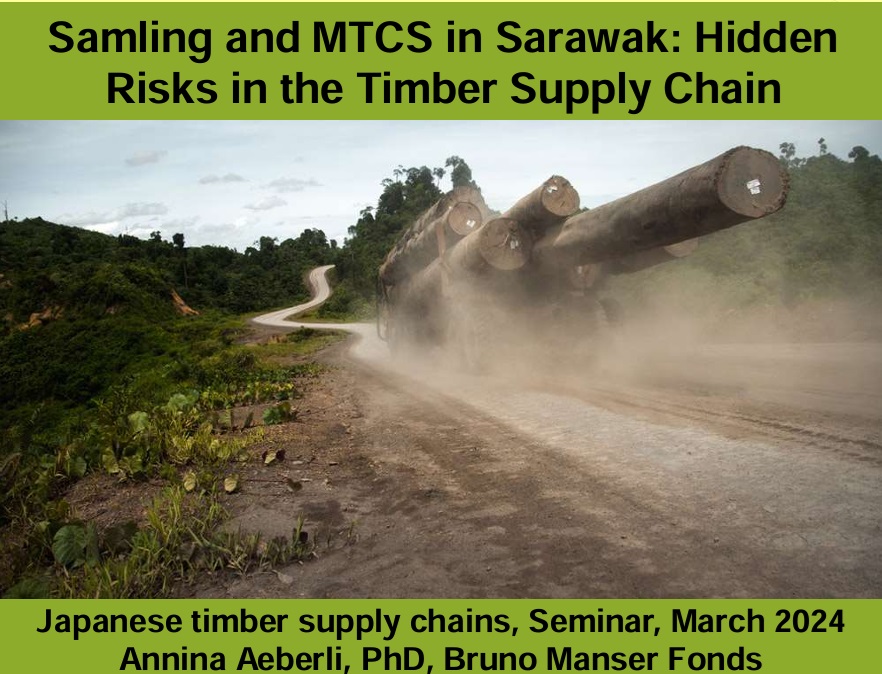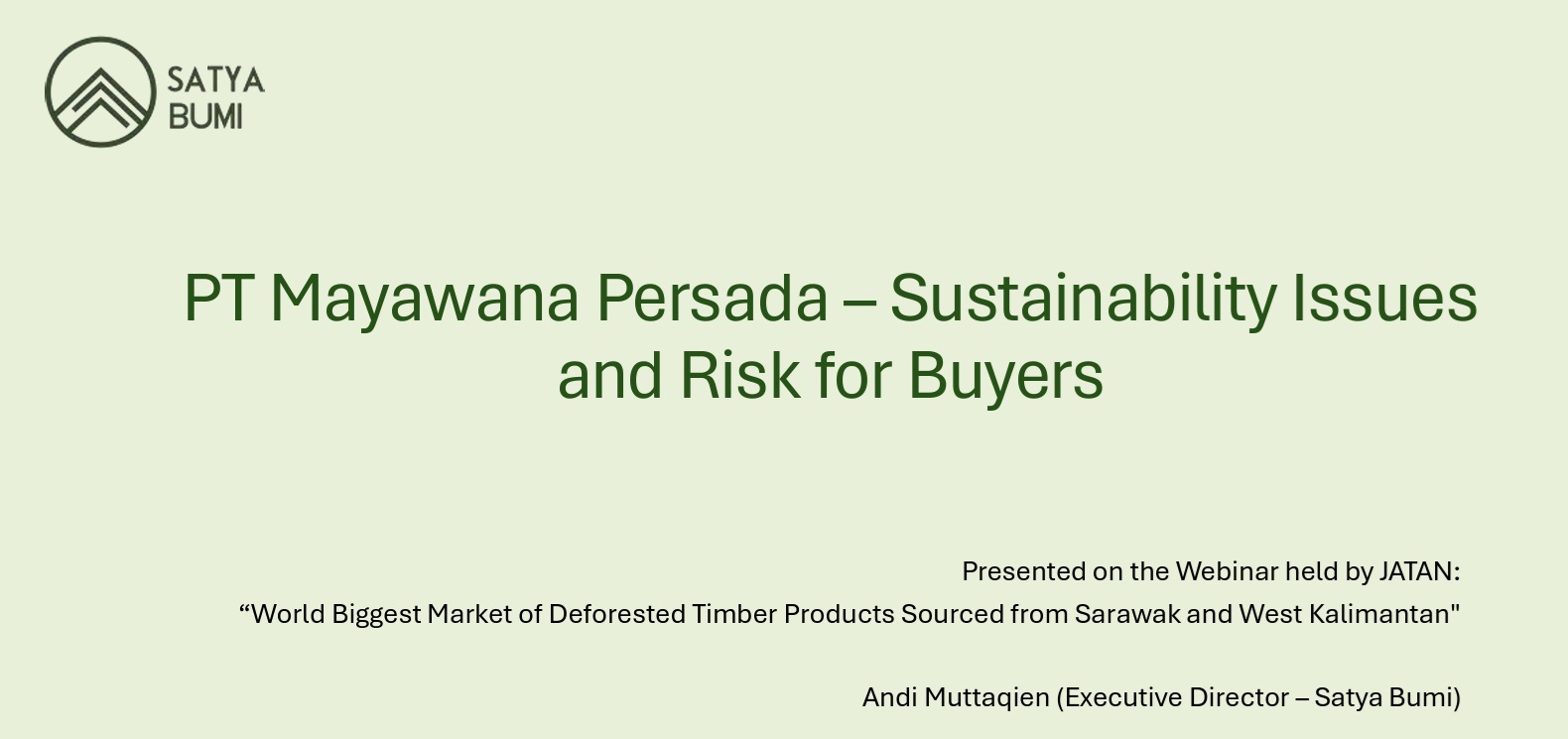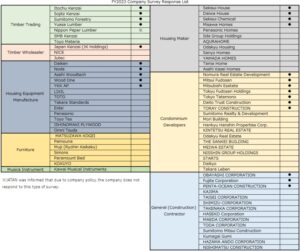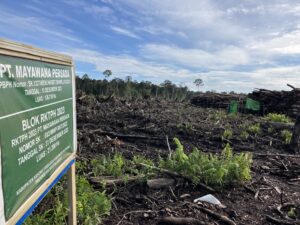Risks Hidden in Timber Supply Chain Sourced from Tropical Forests in Borneo
On March 18, 2024 Japan Tropical Forest Action Network (JATAN) organized a webinar titled
Risks Hidden in Timber Supply Chain Sourced from Tropical Forests in Borneo
- Views from the scene in Sarawak (Malaysia) and West Kalimantan (Indonesia) -
In conjunction with the webinar, JATAN announced the results of FY2023 Corporate Survey on Procurement of Tropical Timber Products. The survey, conducted for the sixth time since 2016, covered 74 Japanese companies, mainly major companies, that deal with tropical wood plywood in 2023. Of the 74 companies surveyed, 24 responded, while the remaining 50 companies did not respond.
Some companies have made a certain progress in addressing risks from Malaysian Sarawak and Indonesian timber.
Please see the details on FY2023 Corporate Survey results.
The new EU Deforestation Regulation (EUDR) is an important turning point in the global fight against deforestation. It will start to apply on 30 December 2024.
The EUDR prohibits the European import and export of products that contribute to deforestation, new challenges and obligations for those involved in supply chains. The EU is so strongly committed because it is aware of the seriousness of the climate change and biodiversity crises and the role that forests can play in these crises.
Japan will fully enact the revised Clean Wood Act from April 1, 2025.
The proposed amendment would make it mandatory to check legality, which had previously been an obligation for businesses to make an effort to do so. The amendment also aims to strengthen Japan's measures against illegal logging, which have been far behind the curve, by making it mandatory through the inclusion of penalties.
Japan, however, lags hopelessly behind Europe and other countries.
At the webinar, guest speakers Dr Annina Aeberli and Mr Andi Muttaqien talked about forest concessions in Borneo island where the forests have been logged atrociously for timber products shipping to Japan.
Annina Aeberli, PhD, has been a campaigner with the Bruno Manser Fonds, a Swiss NGO committed to protecting the threatened tropical rainforests and defending Indigenous rights in Sarawak, Malaysia, since 2011. She has been supporting various Indigenous grassroots campaigns in Sarawak, especially around logging and mega-dams. She studied Geography, Social Anthropology and Development Studies and completed her doctorate in Social Anthropology about how the Indigenous Kenyah of Borneo relate to the environment at the University of Bern, Switzerland, in 2021. She also holds a certificate in intercultural mediation.
Dr Aeberli outlines in detail how Samling’s ongoing breach of certification standards has continuously failed to result in adequate improvements, with very little consequence. Samling is one of the “Big Six” logging companies, which have dominated Sarawak’s timber boom for decades. She also names some of Samling’s international buyers including Japanese recipient companies and traces its exports around the world, lifting the veil on its convoluted corporate structure
A groundbreaking 100-page report released by US-based NGO The Borneo Project and Swiss-based Bruno Manser Fonds reveals critical cracks in Malaysia's government-endorsed Malaysian Timber Certification Scheme (MTCS). The report entitled "Lost in Certification: How forest certification greenwashes Samling's dirty timber and fools the international market" compiles years of evidence from Indigenous communities in Malaysian Borneo impacted by the logging industry.
Download Dr Aeberli's webinar slides here

Andy Muttakien is Executive Director of Satya Bumi Lestari, an Indonesian environmental and human rights advocacy organization based in Jakarta. He was previously Deputy Director of the Institute for Policy Research and Advocacy (ELSAM). He is actively involved in advocating for the human rights of workers in plantation enterprises, and corrective and advocacy activities for the grievance mechanisms of the Roundtable on Sustainable Palm Oil (RSPO). He is also the coordinator of the Public Interest Lawyers Network (PIL-Net) and has spoken at numerous Indonesian and international seminars on the UN Guiding Principles on Business and Human Rights (UNGP).
Mr Muttakien exposes how the PT Mayawana Persada, previously a subsidiary of Alas Kusuma, cleared nearly 20,000 hectares of rainforest in the period 2018-2022, with the majority of that on carbon-rich peatlands and orangutan habitat – that's equivalent to 37,375 football pitches. A huge volume of logged timber is used for plywood products destined for Japan.
In August 2023, Mighty Earth filed a complaint against the Alas Kusuma Group with the Forest Stewardship Council (FSC) finding that the group violated the FSC Policy for Association. Alas Kusuma violated the rights of local Indigenous groups whose customary sacred land and forests were destroyed.
Download Mr Muttakien's webinar slides here

Watch the webinar (YouTube)
Note: JATAN's organized webinar was supported by the Patagonia Environmental Grants Program.


